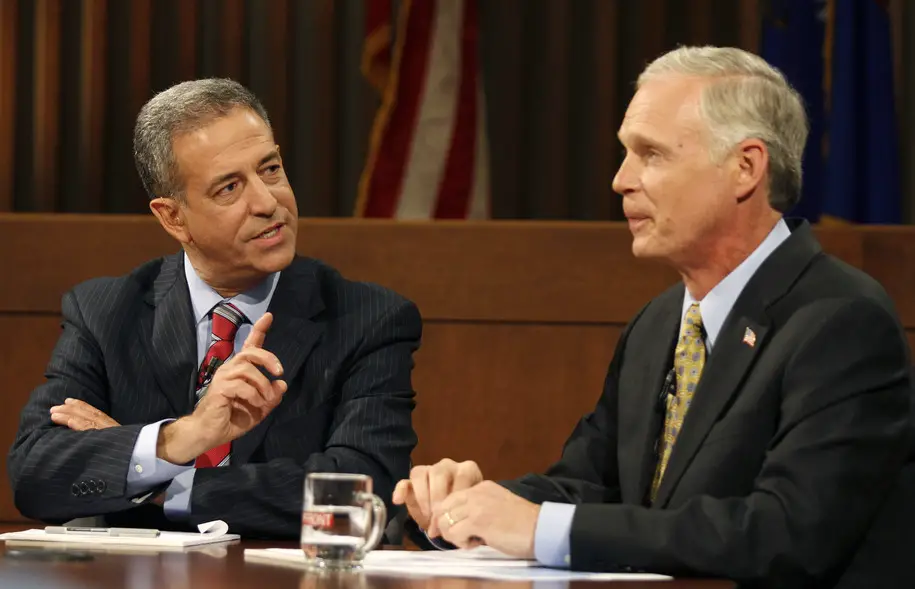The Tea Party “Wave” of 2010 gave the GOP a net pickup of six senate seats—and 54 seats, and majority power, in the House. But many of these seats were won in swing districts. And here’s an important point: Democrats are stronger in presidential years, such as this year; while the “wave” came six years ago—in an “off year.”
With all the focus on the presidential primaries, there has been less attention paid to the House and Senate. We’ll try to catch you up on more than the presidential race, since control of the senate seriously is in question.
First, let’s look at the next presidential primary state (Tuesday, April 5th), Wisconsin. The state has one of the most closely watched races in the country, and it doesn’t look good for the incumbent.
The race is between Johnson and Russ Feingold, whom Johnson defeated in 2010, in the Tea Party wave year. Polling this year suggests a swing back to Feingold, with RealClearPolitics giving him a 12-point lead in polls from October and February.
And, according to the Milwaukee Wisconsin Journal Sentinel, the race will be mean and dirty:
The race between Democrat Russ Feingold (left) and Sen. Ron Johnson is shaping up to be among the closest-watched Senate races nationally. And the images of both candidates are expected to take a hit, particularly with outside groups expected to sling plenty of mud. . .
“Historically, rematches between candidates are often pretty negative affairs,” said Charles Franklin, director of the Marquette University Law School poll.
The Johnson-Feingold race is shaping up as one of the more important Senate contests in the country, and outside groups are already spending millions of dollars on the campaign. . .
It will be a far cry from the 2010 race.
The article points out that both candidates were popular in their last match-up. It was just an anti-incumbent year. But that was before the recall attempt against Governor Scott Walker in May of 2012—to the joy of the GOP—and the surprising defeat of popular ex-governor Tommy Thompson, running for senate in November of 2012. He was defeated by Tammy Baldwin, who became Wisconsin’s first woman senator—and the country’s first openly gay senator.
As noted, the 2010 Feingold-Johnson race was between popular candidates, who ran mostly positive campaigns, so both are still relatively popular.
The most recent Marquette poll, released in November, showed Johnson viewed favorably by 27% of registered voters and unfavorably by 38% with 35% unable to rate him, while Feingold was viewed favorably by 43% and unfavorably by 36% with 22% unable to rate him.
Overall, Feingold was supported by 49% of registered voters, while Johnson received 38% support.
Put succinctly, the candidates will be throwing punches, according to Brian Nemoir, a Republican strategist who worked for Thompson.
“Ron Johnson has the job of reminding people of why this guy wasn’t elected six years ago, and Feingold has the job now of running against an incumbent and comparing the promises he made to what he has or has not delivered,” Nemoir said.
As we go along, we’ll try to fill you in on vulnerable senators of both parties. And that may depend on the national race. So, where does Johnson stand relating to Trump/Cruz?
We were able to find from Buzzfeed that Johnson thinks Cruz’ citizenship is a legitimate question:
Ron Johnson Agrees With Trump: Cruz Should Get Declaratory Judgement On Eligibility.
“I heard Donald Trump say, have Ted Cruz go to the court and get a declaratory judgement, maybe that’s the best way to take care of this and get it out of the way,” the Wisconsin senator said.
But. . .then. . .there’s this:
Republican U.S. Sen. Ron Johnson is leaving the door open to a future break from Republican presidential frontrunner Donald Trump, after Trump initially refused to denounce the Ku Klux Klan over the weekend.
Johnson’s race is going to be rough. The Tea Party “wave” has ebbed, we’re in a presidential year (in which Democrats are stronger), and he’s running against the popular former senator, and he is caught in the middle of the Trump-Cruz battle.
Donate Now to Support Election Central
- Help defend independent journalism
- Directly support this website and our efforts
